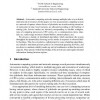Free Online Productivity Tools
i2Speak
i2Symbol
i2OCR
iTex2Img
iWeb2Print
iWeb2Shot
i2Type
iPdf2Split
iPdf2Merge
i2Bopomofo
i2Arabic
i2Style
i2Image
i2PDF
iLatex2Rtf
Sci2ools
136
click to vote
EURONGI
2006
Springer
2006
Springer
Job Scheduling for Maximal Throughput in Autonomic Computing Systems
Abstract. Autonomic computing networks manage multiple tasks over a distributed network of resources. In this paper, we view an autonomic computing system as a network of queues, where classes of jobs/tasks are stored awaiting execution. At each point in time, local resources are allocated according to the backlog of waiting jobs. Service modes are selected corresponding to feasible configurations of computing (processors, CPU cycles, etc.), communication (slots, channels, etc.) and storage resources (shared buffers, memory places, etc.) We present a family of distributed algorithms which maximize the system throughput by dynamically choosing service modes in response to observed buffer backlogs. This class of policies, called projective cone scheduling algorithms, are related to maximum pressure policies in constrained queueing networks, and are shown to maintain stability under any arrival combination within the network capacity. They operate without knowledge of the arrival rates an...
Autonomic Computing | Autonomic Computing Networks | Computer Networks | EURONGI 2006 | Service Modes |
Related Content
| Added | 22 Aug 2010 |
| Updated | 22 Aug 2010 |
| Type | Conference |
| Year | 2006 |
| Where | EURONGI |
| Authors | Kevin Ross, Nicholas Bambos |
Comments (0)

